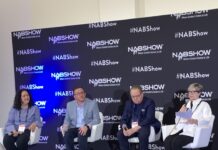
For the fourth year in a row, Andrew Curran, President and COO, DMR/Interactive has penned an Open Letter to Radio. This time around, Curran reminds radio about advertising giant Procter & Gamble’s sage advice to “focus on your bread and butter,” namely broadcast radio. Here’s the letter…
Labor Day 2019
An Open Letter to Radio
The last time the Radio Show came to Texas (Austin, 2017), advertising giant P&G took the stage and encouraged radio to focus on your “bread and butter,” namely broadcast radio. “It’s a gimme. You’re selling water in the desert, you have what I want. How can you fail at selling me what I want?”
The reason this advice was necessary? John Fix from P&G recounted hour-long meetings with radio companies where, for 50 minutes, “I will hear about everything you’ve never done but want to. I hear about podcasts you’ve never broadcast. I hear about targeting. And what I really want to talk about is how you can touch 93% of the United States.”
Radio is a daily companion for employed consumers who advertisers need to reach. Meanwhile, people who are out of the workforce don’t listen to a lot of radio. They also don‘t have much disposable income to spend with advertisers.
As Procter & Gamble has ramped up its investment in radio, its stock price has followed suit and is trading at an all-time high. Not a bad testimonial for radio, especially for buyers and advertisers skeptical of radio’s enduring strength and dominance in a digital world.
As the saying goes, it’s harder to stay on top than it is to get there in the first place.
For radio to continue to grow and deliver strong ROI to advertisers, those of us working in the industry need to keep getting better.
In that regard, insights into athletic performance and what separates champions from the rest of the field are both interesting and informative.
Researchers have found that champions consistently have a unique reaction to challenges. They view obstacles in a positive light – as opportunities to grow – and overcome them thanks to a “never satisfied” attitude.
This runs in contrast to “almost-champions,” who blame setbacks on external causes, become negative, and lose motivation.
Most notably, researchers have discovered that the best goal is also the simplest: Get better.
Champions are driven from within. Their primary concern is self-improvement. They hold themselves to high standards, but judge themselves against prior versions of themselves, not against others.
Almost-champions, on the other hand, focus on external benchmarks, like national rankings or how they compare to rivals.
The research also found that champions seek empowering, lasting mentors. Coaches who empower their athletes and take a longer-term perspective. This differs from the experience of almost-champions, who recall their coaches as being focused on immediate results, “often seeming to drive the bus more than the performer.” Not surprisingly, almost-champions change coaches frequently whereas champions maintain long-term relationships.
These insights on what separates champions from others applies across radio: programming, sales, promotions, on-air, imaging, management, research, consultants, marketers, software providers, and on down the line.
Advertisers need people across radio to keep getting better and to continue delivering what they can’t get on any other platform – maximum reach to an employed audience with money to spend.
2019 has proven to be an important year for radio, and 2020 should be a bumper crop that sets the tone for a new decade as we focus on growing industry revenue to $20 billion by 2022 (#20×22).
We are grateful to work with talented and dedicated professionals across markets and formats as we together enhance radio’s highly profitable business model and ensure an ongoing commitment to operating in the “public interest — convenience and necessity.”
This letter is the latest installment in an annual series that started in 2016, written to coincide with Labor Day, radio’s unofficial holiday; a claim made possible because employed persons make up the dominant percentage of listeners across markets and formats. Earlier editions of the letter are available here: 2016, 2017, 2018.
On behalf of Catherine Jung, Doug Smith, Jen Clayborn, and everyone at DMR/Interactive, thank you for working to drive radio forward.
Happy Labor Day!
Andrew Curran
President and COO
DMR/Interactive






While shelley dines on the red herrings she doesn’t throw out for, I am obliged to admit I failed at radio sales – when I was 18 years old! My hippy-hair might have also been a factor. That, and the fact that I had nothing in the quiver other than, “Oh, hey man. Wanna cop some spawts?”
I was and always have been a performer.
Besides, the above article makes no specific reference to sales techniques at all.
Plus, I have already noted that I agree with the premises of the article.
I have wondered before if “shelley” has a “happy place” to which she can take some comfort.
” A performer”
It’s easy to imagine you with a ring in your nose, juggling balls while seated on a unicycle singing “I’m Henry The Eighth I Am”. In your “hippy hair”.
Note to shelly or whomever:
Say, you wouldn’t be one of those incompetent AE’s with ink stains on her hands, now would you?
I am and have been satisfied that radio could be one of the most powerful of media.
But first, a lot of participants have to learn how to make it work. 🙂
Sold a lot more than you did when you tried and failed, Ronnie. You admitted right here that you failed at radio sales. So, shuttup and have a average weekend.
Andrew is correct in that “it’s the person who’s holding the pen.”
Too bad that radio has given the pen to AE’s that have never studied the process.
Worse yet, many of those same AE’s have handed the pen over to the clients.
This is a strategy for failure.
And it’s working!
Failure is assured.
Don’t pay any attention to Ronnie, Andrew. He can take a marvelous article like yours and attempt to turn it his odd way so others jump in and get infected. Deep down, Ronnie dislikes people who praise radio. Ignore him.
Thanks for the great commentary, Andrew. I was especially interested in your comparison of a champion that chooses a coach/mentor they can stay with and an almost champion that switches often. The champion has made it to the top and sticks with what works, theoretically until it doesn’t. The almost champion needs to keep trying new things to become a champion. Some of the most difficult decisions involve trying something new and uncomfortable to see if it moves the needle. Radio and all businesses need more people willing to take risks, fail fast and move on to rise to the level of champions.
Getting better isn’t a top down mandate, it starts from within. Dinner napkin copywriting reflects poorly on radio overall, but it’s not the entire industry who’s guilty in that moment, it’s the person who’s holding the pen.
Marvelous commentary, and who could argue?
However, radio has yet to demonstrate it wants to get better at enhancing audience satisfaction. Nor has radio taken any steps to generate more efficient and compelling advertising for its clients.
Dinner napkin copywriting is still the norm.
“Getting better” doesn’t seem to be in the cards.